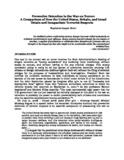Preventative Detention in the War on Terror: A Comparison of How the United States, Britain, and Israel Detain and Incapacitate Terrorist Suspects
| dc.contributor.author | Blum, Stephanie Cooper | |
| dc.date | 2008-10 | |
| dc.date.accessioned | 2013-01-03T16:26:49Z | |
| dc.date.available | 2013-01-03T16:26:49Z | |
| dc.date.issued | 2008-10-00 | |
| dc.identifier.citation | Homeland Security Affairs (October 2008), v.4 no.3 | |
| dc.identifier.uri | https://hdl.handle.net/10945/25043 | |
| dc.description | This article appeared in Homeland Security Affairs (October 2008), v.4 no.3 | en_US |
| dc.description.abstract | After September 11, 2001, the Administration decided to detain individuals suspected of being members or agents of al Qaeda or the Taliban as enemy combatants and hold them indefinitely for the duration of the war on terror. The rationale behind this system of preventive detention is to incapacitate suspected terrorists and facilitate interrogation. While the need for preventive detention is legitimate, the Administration asserts that its decision-making process to label individuals as enemy combatants should exclusively reside within the executive branch, thereby bypassing the checks and balances that comprise America's democratic system. Israel and Britain have been dealing with terrorism for decades, and both countries have shown that democracies facing comparable terrorist threats can implement preventive detention policies that are not based on unilateral executive usurpation of power. This article explores whether any insights can be gleaned from Israel's and Britain's forms of preventive detention in order to make a recommendation to the next Administration. | en_US |
| dc.language.iso | en_US | |
| dc.publisher | Monterey, California. Naval Postgraduate School | en_US |
| dc.publisher | Center for Homeland Defense and Security | en_US |
| dc.rights | The copyright of all articles published in Homeland Security Affairs rests with the author[s] of the articles. Any commercial use of Homeland Security Affairs or the articles published herein is expressly prohibited without the written consent of the copyright holder. Anyone can copy, distribute, or reuse these articles as long as the author and original source are properly cited. | en_US |
| dc.title | Preventative Detention in the War on Terror: A Comparison of How the United States, Britain, and Israel Detain and Incapacitate Terrorist Suspects | en_US |
| dc.type | Article | en_US |
| dc.description.distributionstatement | Approved for public release; distribution is unlimited. |





